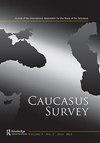‘Nobody Will Marry You If You Don’t Have a Pension’. Female Bribing Practices in Dagestan, North Caucasus
IF 0.4
Q3 AREA STUDIES
引用次数: 1
Abstract
Gendered dimensions of informality have been only briefly studied by anthropologists. Therefore, while engaging in the debate on informality it is important to ask how women engage in informal practices, and whether these practices are gendered. In this paper we analyse female bribing practices in the Republic of Dagestan and take a closer look at the arrangements of state welfare benefits, particularly the disability allowance and the old age pensions. How do Dagestani women engage in bribing? Why is it mostly women who ‘arrange’ state welfare benefits? What are the implications of this engagement for them? Based on case studies from fieldwork in the Republic of Dagestan carried out between 2014–2019 we show that bribing practices are gendered. We also reveal that having the resources to outsmart the state by buying benefits empowers women in a society where patriarchal arrangements are predominant. More broadly, we discuss how resistance at one level may lead to unexpected empowerment at another. By emphasizing the female perspective, this paper makes a contribution to post-Soviet area studies and anthropological studies of corruption and informality more generally.“如果你没有退休金,没有人会嫁给你”。北高加索达吉斯坦的女性贿赂行为
人类学家只对非正式性的性别维度进行了简短的研究。因此,在参与关于非正式性的辩论时,重要的是询问妇女如何参与非正式做法,以及这些做法是否具有性别特征。在本文中,我们分析了达吉斯坦共和国的女性贿赂行为,并仔细研究了国家福利的安排,特别是残疾津贴和养老金。达吉斯坦妇女是如何进行贿赂的?为什么主要是女性“安排”国家福利?这种参与对他们有什么影响?根据2014年至2019年间在达吉斯坦共和国进行的实地调查的案例研究,我们发现贿赂行为是性别化的。我们还发现,在父权制占主导地位的社会中,拥有通过购买福利来智胜国家的资源,赋予了女性权力。更广泛地说,我们讨论了一个层面的阻力如何会导致另一个层面出乎意料的赋权。通过强调女性视角,本文为后苏联地区的研究以及更普遍的腐败和非正式的人类学研究做出了贡献。
本文章由计算机程序翻译,如有差异,请以英文原文为准。
求助全文
约1分钟内获得全文
求助全文
来源期刊

Caucasus Survey
Arts and Humanities-History
CiteScore
1.30
自引率
9.10%
发文量
4
期刊介绍:
Caucasus Survey is a new peer-reviewed, multidisciplinary and independent journal, concerned with the study of the Caucasus – the independent republics of Armenia, Azerbaijan and Georgia, de facto entities in the area and the North Caucasian republics and regions of the Russian Federation. Also covered are issues relating to the Republic of Kalmykia, Crimea, the Cossacks, Nogays, and Caucasian diasporas. Caucasus Survey aims to advance an area studies tradition in the humanities and social sciences about and from the Caucasus, connecting this tradition with core disciplinary concerns in the fields of history, political science, sociology, anthropology, cultural and religious studies, economics, political geography and demography, security, war and peace studies, and social psychology. Research enhancing understanding of the region’s conflicts and relations between the Russian Federation and the Caucasus, internationally and domestically with regard to the North Caucasus, features high in our concerns.
 求助内容:
求助内容: 应助结果提醒方式:
应助结果提醒方式:


